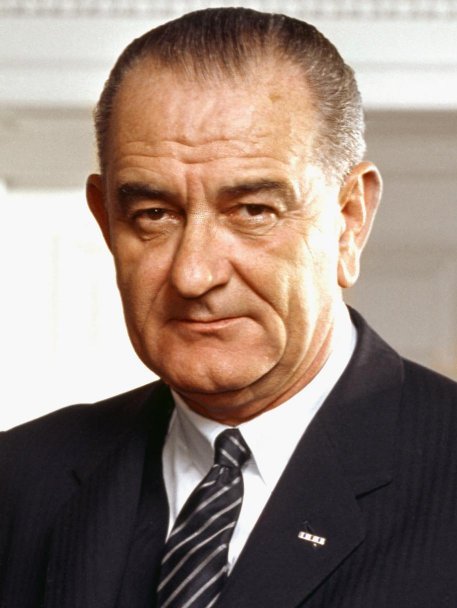Lyndon
Baines Johnson (August 27, 1908 – January 22, 1973),
often referred to as LBJ, was the 36th President of the
United States (1963–1969), a position he assumed
after his service as the 37th Vice President of the United
States (1961–1963). He is one of only four people
who served in all four elected federal offices of the
United States: Representative, Senator, Vice President,
and President. Johnson, a Democrat from Texas, served
as a United States Representative from 1937 to 1949 and
as a Senator from 1949 to 1961, including six years as
United States Senate Majority Leader, two as Senate Minority
Leader and two as Senate Majority Whip. After campaigning
unsuccessfully for the Democratic nomination in 1960,
Johnson was asked by John F. Kennedy to be his running
mate for the 1960 presidential election.

36th
President of the United States
Johnson
succeeded to the presidency following the assassination
of John F. Kennedy on November 22, 1963, completed Kennedy's
term and was elected President in his own right, winning
by a large margin over Barry Goldwater in the 1964 election.
Johnson was greatly supported by the Democratic Party
and as President, he was responsible for designing the
"Great Society" legislation that included laws
that upheld civil rights, public broadcasting, Medicare,
Medicaid, environmental protection, aid to education,
and his "War on Poverty." Johnson was renowned
for his domineering personality and the "Johnson
treatment," his coercion of powerful politicians
in order to advance legislation.
Meanwhile,
Johnson escalated American involvement in the Vietnam
War, from 16,000 American advisors/soldiers in 1963 to
550,000 combat troops in early 1968, as American casualties
soared and the peace process bogged down. The involvement
stimulated a large angry antiwar movement based especially
on university campuses in the U.S. and abroad. Summer
riots broke out in most major cities after 1965, and crime
rates soared, as his opponents raised demands for "law
and order" policies. The Democratic Party split in
multiple feuding factions, and after Johnson did poorly
in the 1968 New Hampshire primary, he ended his bid for
reelection. Republican Richard Nixon was elected to succeed
him. Historians argue that Johnson's presidency marked
the peak of modern liberalism in the United States after
the New Deal era. Johnson is ranked favorably by some
historians because of his domestic policies.
Interest
in Space
Of
all the presidents, no president had a longer and more
sustained interest in space than did Lyndon Johnson. His
interest began as a Senator as he watched Sputnik 1 fly
over on the day of its launch, as he stood along the banks
of the Pedernales River that ran through his ranch.
Johnson
clearly understood the importance of controlling technology
involving outer space in light of the Sputnik launch.
On January 7, 1958, as Senate Majority Leader, Johnson
made a key political speech on the subject.
First,
it is obvious that the Soviet valuation on the significance
of control in outer space has exceeded that of our officials.
The
sputniks now orbiting the earth are not military weapons,
but have military potential.
Control
of space means control of the world, far more certainly,
far more totally than any control that has ever or could
ever be achieved by weapons, or by troops of occupation.
The
race we are in - or which we must enter - is not the race
to perfect long-range ballistic missiles. There is something
more important than any ultimate weapon. That is the ultimate
position - the position of total control over earth lies
somewhere out in space.
This
is the future, the distant future, though not so distant
as we may have thought. Whoever gains that ultimate position
gains control, total control, over the earth for purposes
of tyranny or for the service of freedom.
While
a Majority leader in the Senate, Johnson sat on three
space committees:
• The Investigating Subcommittee of the Committee
on the Armed Services.
• The Special Committee on Space and Astronautics.
• The Senate Committee on Aeronautical and Space
Sciences.
Once
he became the vice-president, Kennedy appointed him as
the first vice-president chairman of the National Aeronautics
and Space Council. This appointment came at a critical
time for the space program in the race to put a man on
the moon. The first rockets had just been launched, and
now there was a race to the moon.
President
Nixon ended up being the president in office when man
finally walked on the moon. He was able to bring the Apollo
astronauts to the White House for the important public
relations spin-offs. Kennedy was the President who got
credit for the decision to go to the moon. Johnson, on
the other hand, was written up as the president of the
most unsuccessful war in American history.
Even
though Kennedy and Nixon got all the credit for the moon
landing, there is no doubt, however, that Johnson as vice-president
and then president was the essential White House force
in putting a man on the moon. For a good portion on the
sixties, NASA was the "number one government agency."
Today, it wouldn’t even be in the top ten.
Sources:
http://en.wikipedia.org/wiki/Lyndon_B._Johnson
http://www.presidentialufo.com/lyndon-b-johnson
